#tag: meta
Explore tagged Tumblr posts
Text
this is a stupid me personal thing. but Fereldan names have always driven me a little bit insane because they are a hodgepodge of different Britonnic languages with no rhyme or reason. the devs will take one name, and use all versions of it: Scottish Gaelic, Welsh, Irish, Cornish, and then some Germanic variants to boot.
which etymologically is very frustrating and sloppy world building to me. incredibly niche pet peeve, i know. but languages are my specialty and such careless use does invite questions
e.g. Mhairi, Moira, Maura, Miriam are all different language representations of the same name. how did that come about? or Wynne and Fiona being a Welsh and Irish representation of the same root, and they are in a room having a conversation, and I'm here wondering when did the language split?
one could ostensibly make a case that before Calenhad united Ferelden, all the Alamarri tribes had one single root language family but it devolved in these related but different languages
but. regardless. as I was looking up all the names and trying to map out where they fall in the actual Earth languages
i made a discovery i should have really made a long time ago
which is: i know from general history examples -- and also other fiction (*cough* Dishonored *cough*) that Teague is an Irish masculine name
based on that knowledge, I never questioned Teagan
but Teagan (also spelled as Tegan) = while most certainly related to the name above = actually follows the same logic as such names as Megan / Meagan. or Regan / Reagan. current unfortunate association with a president who ruined everything notwithstanding, Regan is King Lear's daughter. and Regan is the child protagonist of The Exorcist, a girl tormented by the demon. these are feminine names. TEAGAN is a traditionally feminine name
another OBVIOUS example being of course the ever famous sister-duo Tegan and Sara. but. based on the queerness. I kind of assumed the opposite? that it was a butch thing and she wanted to use a masc name? or that the name is just unisex and the popularity with one gender or the other changed with time, like it did for Addison, or Cameron, or Ashley. or that the spelling made a difference
but no. straight-up. historically it's a woman's name
and listen. i'm all for unexpected unisex names. Artemis Fowl? Star Trek: Discovery's Michael and Pushing Daisies' Chuck? hellyeah. my own name is traditionally masc and I'm fem-presenting
but also i'm just saying: trans!Teagan
(they did blithely retcon and canonize that Eamon and Teagan had polyamorous parents. that their father had a wife and a male lover (Connor) whom Rowan, Eamon and Teagan also considered a father. and Eamon named his son after the man. so honestly this isn't the most wild headcanon I could put forth about them)
#the biggest mystery is how come Eamon is such a conservative killjoy misogynistic drip#because literally everyone else in his family sounds dope as fuck#dragon age origins#teagan guerrin#bann teagan#tag: personal#ch: teagan guerrin#tag: meta#? idk i'll tag it for myself as meta even though it's not :3
11 notes
·
View notes
Text


"...--perhaps one day you will see victory in the arena, Beau, though I am always surprised to see that you are in good spirits afterwards - win or lose."
"And why not?" The warrior replied, a grimaced grin upon her features. Good spirits, after all, did not dull the pain of a bullet in the back. "I am able to leave this place, after all; hale and hearty and none the worse for wear. There's naught to prove in this arena, for me. That I can get up, shake my opponent's hand, and depart? That will always be a victory unto itself. I'd not have it any other way."
Dawnstrider had never considered herself crafty. Though, in times such as these, she occasionally saw the merit in the adjective bestowed unto her. Perhaps others in her position would be glad to wear the title with pride and honour befitting a fabled hero, but she was no such person. Faceless; nameless. Unrecognisable, save for her white hair, and she'd not have it any other way.
The walls of the Hallow were her sanctuary; her respite. The patrons; her friends, companions, and strangers alike. There, she was known - but unassumingly so. She could lean upon a wall and remain unbothered for the eve, opting to people-watch and eavesdrop on conversations about memories; desires; dreams. The stories of others took the spotlight and swept people's attention and concerns by the boatload, and she'd not have it any other way.
Here, she was Beau Dawnstrider: registrar; adventurer; beloved companion to some and a cheerful, friendly face to others... and very unfortunate indeed, unanimously agreed, when it came to any manner of pit fight - and she'd not have it any other way.
There's a good amount of folks who indulge me (for whatever reason) and subscribe to Beau being their Warrior of Light in-game. It changes very little about her, in truth, but one of the things I often have to navigate is the reality that she is an incredible fighter - at least enough of one to be able to defeat the foes she does - and I am putting her into scenarios where fights are determined by random dice rolls... which I often lose.
Being who she is, though, the solution is pretty straightforward for me - and though it's kind of become the butt of a joke to have Miss Dawnstrider have her arse handed to her in the arena it has paved a path for me to explore with her that I've really been enjoying. A form of self-acceptance that she need not be perfect, and that she is truly no different from any other being. She is safe in her little sanctuary, and she cares not if she is the butt of people's jokes or the reason for their ego boost. She is just glad that they get to walk away at the end of it, unscathed.
It's a true pleasure - when compared to the horrors she has faced and seen - to be able to say that she can do that each and every time she faces someone in that pit. It is a joy unto itself and nothing will have that grin fade from her face. Not even seven bullets lodged into her body...
I look forward to the day that someone who subscribes to the WoL!Beau bit puts two and two together and realises that the person who is laughing about having been beaten for the ninth time by an arena combatant is the same person who is spoken about - and has been spoken about for years - in legendary fable. Such will come in its own time, though.
#character: beau#ffxiv endwalker#tag: meta#meta: beau#character question: beau#i love that i get to do this!!!!!!!!!#also the post that was promised.#tag: character question
9 notes
·
View notes
Text
What Rhymes With Bottom
What Rhymes With Bottom
Link for the fic: What Rhymes With Bottom
Author: BoneLord
Relationship: Greg Davies/Alex Horne
Additional Tags:
Poetry
Meta
Crack
Breaking the Fourth Wall
top!Alex
bottom!Greg
Humor
Summary:
Alex is tired of reading all these bottom Alex fics. He wants to be the one on top and getting serviced for a change! Is that so much to ask?
#september 2023#prompt: top!alex#author: BoneLord#tag: poetry#tag: meta#tag: crack#tag: breaking the fouth wall#tag: top!alex#tag: bottom!greg#tag: humor#one shot
4 notes
·
View notes
Text
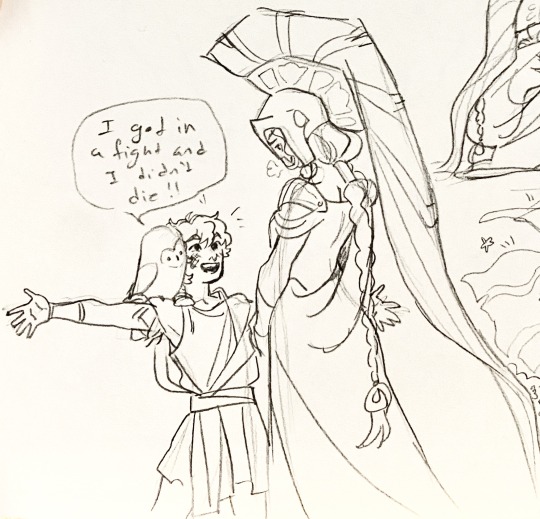
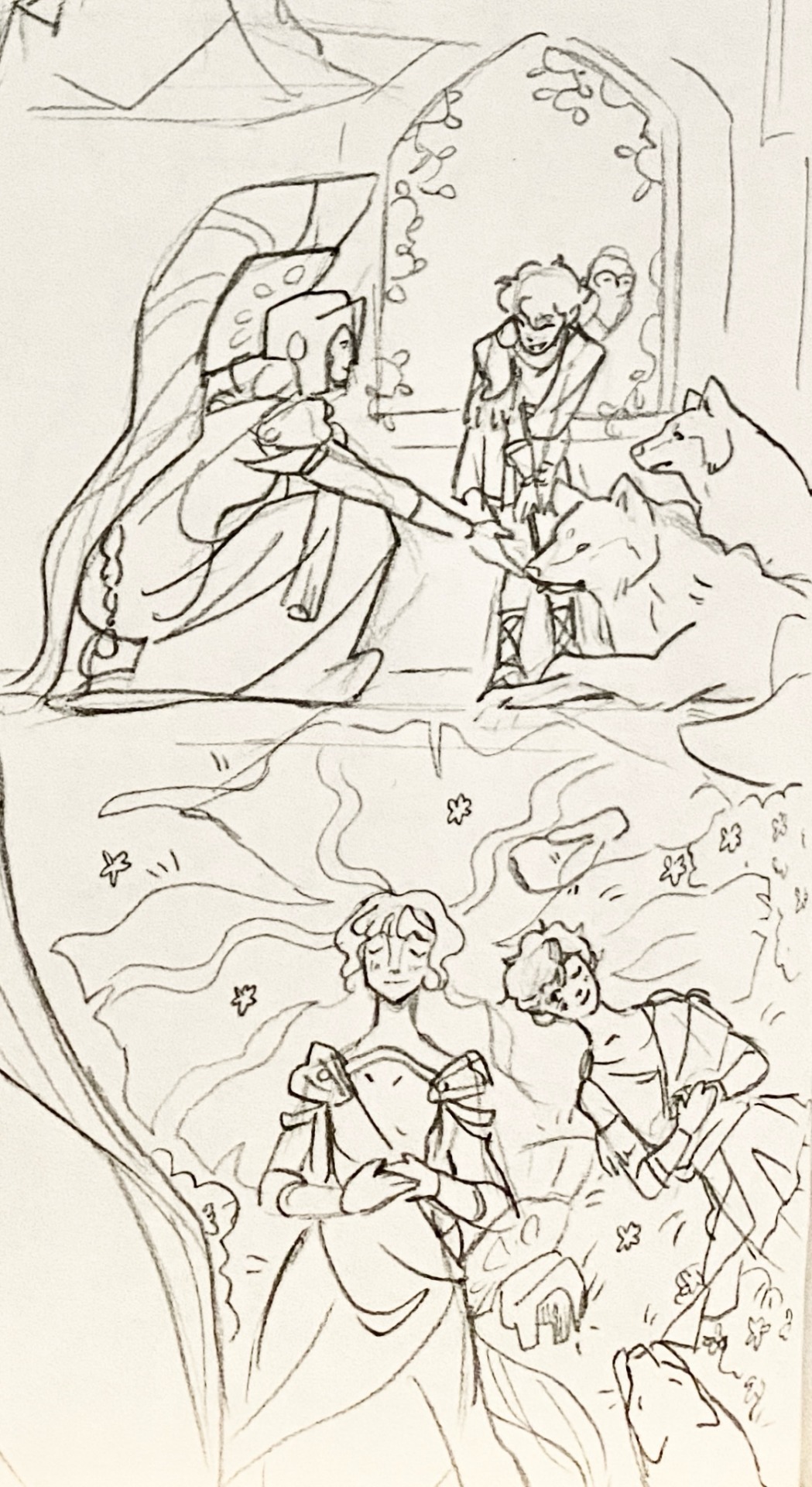
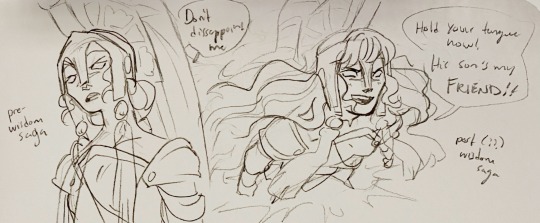
Personally I think that Telemachus permanently and irreversibly changed Athena for the better, more on that at twelve
#I’m sorry for the WORST possible quality pictures and sketches#but they’re fr all I can think about#wisdom saga is where I live now#epic athena#epic telemachus#epic the wisdom saga#epic the musical#epic the musical fanart#sorry to do meta in the tags bug#I think the idea that telemachus’s friendship might have turned Athena into the person she got upset with Odysseus for being#would be delicious#also if you see any inconsistencies in character design or clothes no you didn’t#can’t wait to be able to digital again holy fuck
16K notes
·
View notes
Text
absolutely insane episode as per fucking usual but perhaps most insane detail of all that's gonna get glossed over is the reveal that the birthing cabin was made specifically to facilitate the severed women WHOM JAME EAGAN GOT PREGNANT. not only has he been siring bastard children on mistresses THOSE MISTRESSES WERE INNIES. he's been leveraging his position as the ceo (which in lumonspeak is basically the head of the church, a pseudo-deity figure) to manipulate and seduce women already lacking in personhood whom are emotionally children and then shipping them off to be hidden away when he leaves evidence behind. remember the news broadcast in season 1 mark was watching about a severed woman who became pregnant at work. we finally have an answer to how that happened. it really is just a means of enacting violence against women all the way down huh!!!
7K notes
·
View notes
Text


Feeling insane about this
#it's been long enough I can start posting actual spoilers now right?#I'm 99.9% sure that's the siberian hydra base#the railing and lighting are EXACTLY the same#boy scout shame room my ass#bucky barnes#winter soldier#thunderbolts#thunderbolts spoilers#marvel meta#marvel#hydra trash party#yeah I'm tagging it#HTP FAM STAYS WINNING#they didn't give us much but we can work with this
7K notes
·
View notes
Note
isnt it wild how jayce is the most heavily misunderstood arcane character..everytime i see takes about him being upper-class and rich or mean and condescending or not caring about viktor in s1 or whatever other garbage ppl say about him i lose a year of my life
It's crazy to me that I've been saying jayce is working class for years and this got confirmed in the draft 1 board for arcane christian linke posted on twitter sometime ago lol

house Talis is a MINOR HOUSE of toolmakers whose most prominent contribution is the 'collapsible pocket wrench'. They're literally blacksmiths. This is a service and labor position. Jayce can't even afford to use gold in his inventions in act1 because he relies on the Kiramman money for everything. This is not the life of a rich guy in Piltover this is middle class at best lol his drive to finish up hextech and succeed academically is him trying to build a better life for himself!

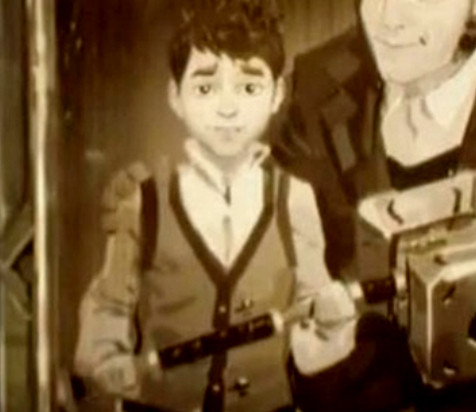
Blacksmithing is historically a very intensive work position. The work wears you down & eventually disables you very early in life (jayce's injury in act3 seems to be a metaphorical speedrun of that, in some ways) we're never told how jayce's dad died but it is very fair to imagine it was a work related. he's fucking aware of this, its true In Real Life and it brings such an interesting context to his interactions with Viktor and how they want to create things that help common laborers and make the work better if it wasn't for the council. (in s1 act2 their progress day showcase to heimerdinger BEGINS with jayce complaining that they've been stuck fulfilling the council's demands these past 10 years and now, finally, *finally* it's their time to decide what to do with hextech. and they're not even allowed that.)
Also, the perfected hexgems in s1 are kept in Kiramman-crest boxes. I noticed this just the other day. JAYCE AND VIKTOR DON'T OWN SHITTTTTTTTTTT they're getting exploited big time while all that 'investor' money is charged back with deep dividends

just like real life academics they probably spent most of their life writing up grant proposals like dogs and begging for funding that will wring them dry later on. Where the hell is all my jayce and viktor class solidarity 'getting drunk off their mugs and complaining about their dipshit bosses' content?
[related post]
MARCH 2025 UPDATE: just got my Arcane artbook and it directly confirms the Talis family legacy is not big industry, because those weren't even part of the world. It is only post-timeskip that we start to see ramped up production + Jayce's focus is giving magic to the common people.

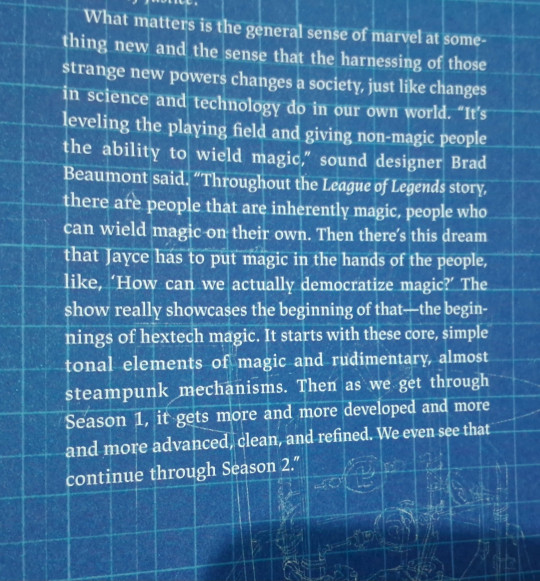
#jayvik#arcane#meta tag#jayce talis#viktor arcane#jayce arcane#vikjayce#viktor lol#jayce lol#viktor league of legends#jayce league of legends#league of legends#hexposts
5K notes
·
View notes
Text

nothing personal but this kind of comment rlly exemplifies to me a disconnect between canon and popular fanon jmart characterization because they almost literally had this conversation in canon - except, their lines are swapped!


jon, for all his scared grouchiness, is a secret romantic, while martin, for all his forced optimism, is at his core a pragmatist
#and it's not like it's a throw away line either#its the penultimate episode and leads directly into the 'Where you go I go - that's the deal' convo#and this isnt the first time I've seen people swap them#otherwise i wouldn'tve made a whole post#tma#tma s5#tma finale#jonmartin#tma meta#stole the screenshot from another post because i didnt want to derail what people are mostly reblogging for a cute moment#and y know. it IS cute. that's why it's so weird that people seem to forget how it's nearly literally canon#EDIT: added that tag to the body of the post cause its rlly the conclusion
10K notes
·
View notes
Text
One of my fav authors just said in their authors note that Sam and Dean retire from hunting like Hayao Miyazaki retires from film making. Which is literally soooo perfect…
Like they are DONE. They are OVER IT. Dean gets a job at a garage and watches too much Food Network. Sam’s working on a dissertation on American folklore. And then he’s conducting an oral history section of his thesis and the “Sasquatch” sighting his subject is describing is REALLY starting to sound like a wendigo….
And of course there are other hunters and they could pass it off. But they’re so close and they basically did all the research already and the undergrad Sam hired for help w interview transcription is just gonna keep poking her nose in it if it doesn’t get taken care of soon.
Anyways, this is the last one. After this, they’re DONE. For real this time.
#also can you tell how much i love history major sam….#that boy likes research and knowledge for knowledges sake WAY too much to be a lawyer be ffr#spn#supernatural#sam winchester#dean winchester#spn meta#mine#as always obligatory#wincest#tag#sams advisor assumed they were married when dean kept showing up w lunch#and now they’re in too deep
2K notes
·
View notes
Text


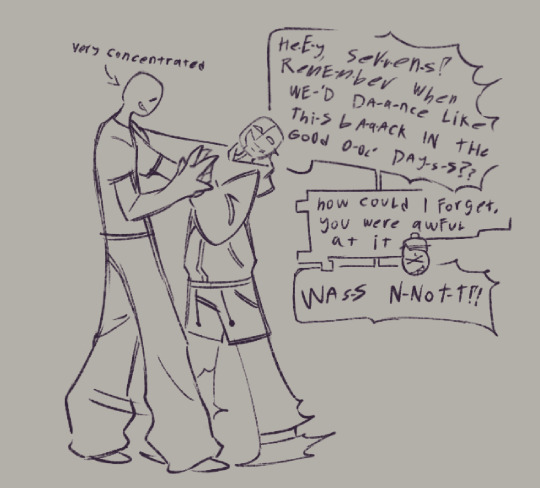


Miscellaneous postsaken slop i didnt know how or when to post
#eat up!#uhhh idk qhat meta commentary to add#thanks itzartsytime for letting me borrow the c00lkidd working at the pizza place in postsaken hc#very awesome very swell#forsaken#forsaken roblox#forsaken art#roblox#roblox art#postsaken au#c00lkidd forsaken#elliot forsaken#noli forsaken#bluudud forsaken#007n7 forsaken#mildes art tag#i hope that last doodle doesn’t get me jumped for information#homicidalporkchops
1K notes
·
View notes
Text
Utena truly said what if Eurydice knew from the start that Orpheus would look back. She knows that this is how the story must end. Orpheus remains optimistically oblivious as he trudges forward. Eurydice waits for him to look back. Look back already, as other so-called "heroes" would. He does not look back. He climbs the crags and steps of the Underworld even as Hades accosts him, leads him down and down and down back to the depths. She wants him to look back, look back and end this spiraling journey of cliffs and chasms. That is how the story ends, after all. Is he purposefully denying fate, or does he truly not know what is to come? All stories have a certain end. He does not look back. She begins to ask him to look back, to beg in woven myth to let it be done already. She throws herself off a cliff, Look back, look back, watch me fall and know that it is done. He casts his head aside as he grasps her arm in his hand. He does not look back. He reaches the precipice, where the story must end even as all else has failed. He is shown a future (a fantasy) without sorrow, without her. He does not look back. Forward, forward. He thinks himself a hero. "Look back," a blade pierces his chest, "look back at your killer. Let this story end, as it should, as it will, for you are no prince." He does not look back. Forward, forward, as rock gives way to dirt. He collapses at the maw of Hades, dewkissed grass at his fingertips. He does not look back. Eurydice steps into sunlight.
AN: Holy shit this blew up
I’d greatly appreciate it if anyone seeing this checked out the addendum as well for a more rounded perspective/a short glimpse at my full opinions on the matter that aren’t filtered through Orpheus and Eurydice. Also, to anyone seeing this who hasn’t watched Utena yet (I’ve seen y’all in the tags), welcome!
#This was way better when I was driving and couldn't write the exact wording I wanted down#demons won so bad#utenanthy#utena tenjou#anthy himemiya#utena meta#ish#revolutionary girl utena#rgu#sku#shoujo kakumei utena#it's been a hot minute since I've done all those tags#ohtoriposting
3K notes
·
View notes
Text
Shipping is fun and all but I swear every single time someone makes a comment, whether as a joke or in a legitimate analysis, about there being "no other explanation" for a pair's interactions, I lose just a bit more of my sanity
Like, no, you guys don't get it. Romance is not about the Amount of devotion, it's about the COLOR. the FLAVOR of it all. a character can be just as devoted to their platonic friend as they are to their romantic partner, and they don't love either of them more, just differently.
But because the majority of people still have it stuck in their minds that romance exists on the highest tier of love, I'm stuck seeing endless takes that boil down to "these two care about each other too much for it to NOT be romantic" as if that's the core determining factor to how literally any of this works
In conclusion: stop telling me that I don't understand the story if I don't interpret the leads as romantic, I am TIRED
#analysis#meta#miscellaneous#fandom#shipping#media discussion#amatonormativity#lgbtq#I feel like tagging any of the fandoms I was thinking of when writing this would be a little mean-spirited potentially#Disclaimer: no one has actually been telling me personally that I don't understand any story in particular#It's just that the way people tend to phrase their analyses feels unnecessarily targeted at the reader and that's just. not great#even if I agree with every other point they make
25K notes
·
View notes
Text
the whole severance process and its subsequent success being manufactured from and built upon the labour and suffering of two women. one a child who designed severance to cope with the reality of the world she was forced into, and one being a woman of colour who was kidnapped and turned into a toy to be used at the whims of a white man. and you all wanted to know why ms huang is a child. well here is your answer. a teenage girl of colour currently under the same scholarship as cobel happily and matter-of-factly carrying out the subjugation of people who only exist because of what lumon exploited out of people like her. lumon having entire institutions dedicated to the continued indoctrination of vulnerable children. lumon systematically ensuring any amount of class or race consciousness or solidarity between their subjects is impossible by having them carry out each other's exploitation on their behalf. the innies just being a new rung at the bottom of the ladder whom the disenfranchised and marginalised can feel empowerment in stepping over. and ms huang is just the next in a long, long line of victims
#ITS CAPITALISM ALL THE WAY DOWN.#severance#severance spoilers#meta tag#harmony cobel#gemma scout#ms huang
7K notes
·
View notes
Text
Sexuality, Acceptability, Risk, and Medieval Bohemia
Someone commented on my Hansry fic recently about how a good number of fics in this fandom apparently feature the sort of modern protestant homophobia emblematic of the United States. This was baffling to me.
More recently I've seen a bit of backlash against this rather normative, America-centric approach to the historical homophobia (deeply entrenched in Catholicism, mind you) that they would have been subject to back then. And, as is quite normal with the internet, naturally the pendulum has swung way too far in the other direction. Jokes were made and then taken seriously by others. I've now seen sentiments floating around like "oh they wouldn't have cared at all," (not on tumblr) which is wild to me.
My doctoral studies have to do with queerness in the High Middle Ages, so seeing as I've spent the last several years of my life living on archive.org, knee-deep in this research, I feel like it's my academic responsibility to correct the record some. As usual, the answer lies somewhere in the middle of the two extremes.
All my sources are listed in the text (in the case of art) or at the very end of the post. For those of you just interested in what all of this means for Hansry, feel free to jump down to the purple heading.
I will start by saying that the "queer medieval utopia" you're looking for didn't exist. The closest you're going to get to that is the late 11th century / early 12th century, and even then there were limits to this general social acceptability. Paris and Florence were commonly considered to be gay dens of iniquity by people outside of those places, but even that was a bit of an exaggeration.
So where does this misconception come from?
Within the Catholic landscape, the body was considered separate from the spirit. Only one's "mystic sensorium" was supposed to be involved in spiritual intercourse with Christ and each other, and the overlap of the real and the ideal was… problematic at times, a genuine threat to chastity. Physical affection was meant to not broach certain limits. Kissing was acceptable. Metaphors were acceptable. In ancient Christianity, it was normal for women to kiss other women and for men to kiss other men as part of mass in the name of exchanging the kiss of peace, the pax. The idea here was to meet with the Spirit of Christ. Ambrose likened it to "lovers who, unsatisfied with the mere enjoyment of the lips, kiss so deeply as to interchange their spirits with one another." Which is all well and good, but this leaves a lot of leeway. How much physical affection was considered acceptable?
Anselm, the closest thing we have to a gay man of this time, would write things like this, in this case a letter addressed to two biological brothers that he hoped to join him in the monastic life:
"My eyes long to see your faces most beloved; my arms stretch out to your embraces; my lips long for your kisses; whatever remains to me of life desires your company . . . . Oh, how my love burns in my marrow . . . . [In coming to Bec] you have fused my soul with yours. If you now leave me, our joint soul will be torn apart, it can never again become two."
He had never met them before, nor should this suggest that they were about to enter a sexual relationship. In fact, around this time we see quite a few such expressions of affection coming out of the monastic space. Alcuin, writing to Arno of Salzburg, felt entirely comfortable writing that his love could not be prevented, even in the face of death, from licking Arno's innermost parts, a reference here (most likely) to Christ's side wound. In another letter, Alcuin is even more overt:
"It is exquisitely sweet to remember your love and intimacy, holy father; I wish the dear moment would come when I might embrace the shoulders of your love with the arms of my longing for you. . . . with what speedy hands I would rush into your fatherly embrace, with what pressing lips I would kiss not only your eyes and ears and mouth, but each knuckle of each finger, of each toe, not once, but many, many times!"
It would be extremely easy to assume that these letters suggested more than meets the eye, but historically speaking, as far as we know, this was not the case. Because this level of affection was considered to be in line with the "Christian" thing to do between brothers (no, I'm not joking). And there were harsh punishments if you breached these limits. Bear in mind, these letters could easily be seen by others!
Moreover, it should be noted that we don't see this level of affection outside of the monastic space (though it does still come up, albeit to a much lesser extent). You can think of it as code switching, essentially. Verbiage that would be considered insanely sexual in one space would not be considered as such within a monastic context prior to the shift in the 12th century.
Some scholars suggested that the use of such language implies ignorance or naivety about how this physical affection could look to the outside world, but we do know that Anselm at one point became worried enough that he might be misunderstood that he censored himself after leaving Bec for Canterbury. Even if his inclinations were chaste, he knew they could be viewed through the lens of homosexuality.
The ideal sexual state for a person to be in at this time was rooted in asceticism: chastity in the face of desire. You'd think asexuality would be a quick workaround for that, but unfortunately the lack of desire would just mean a lack of necessary effort on that person's part. Bear in mind, suffering is what's rewarded here. A gay man plagued with homosexual desires is just being tested by God. By denying himself those desires, he's rising in the ranks of holiness. A great example of this is Brother Lucas from KCD1:

According to the Rule of Pachomius, kissing boys on the lips was forbidden and punished by whipping, imprisonment, fasting, shaving, and six months of humiliation. In Fructuosus of Braga's Rule, a monk kissing or even being "too attentive to young men or boys would result in a very similar six month sentence as well as six additional months of manual labor, separated from his brethren, always under watch of at least two spiritual brothers. Never again was he allowed to enjoy private conversation or companionship with those younger than him.
"But Tam!" you might say. "This is just about monks! What about real people?"
I'm so glad you asked! Because we know that as well!
Penitentials, which were quite in vogue until around the 11th century and then again after the passing of Lateran IV in the early 13th century, were very punishing of all manner of sexuality, but especially homosexual acts, and, among them, especially oral sex. (The mouth is considered, to a certain extent, sacred. Don't ask me why, that alone is like twenty pages in my dissertation, though I could be lowballing tbh.) The Penitential of Theodore punishes it with 7 years of harsh penance and 15 years if the practice is habitual. Sometimes, however, it was "until the end of life" and considered to be the "worst evil," worse than fornication with one's mother. Harsh!
Ye olde penitentials were used as guidelines for later confession as well as those from before the 12th century. Conveniently for us, the late, great James A. Brundage came up with a fantastic chart/guide on when and how it was acceptable to have sex at all:

Did people follow this? My god, absolutely not. We wouldn't have the confessional records if this wasn't a problem in the realm of ~sin. But the guidelines were there and expected to be adhered to.
Don't get me wrong, the late 11th / early 12th century was a watershed moment in history in terms of overall acceptability of queerness, a time when Ovid and other Ovidian literature flourished. Punishments were rarely enforced. But the come-down from that era led us to a very rough landing. Lateran III kicked off the official canon ratification of outlawing homosexuality explicitly, and this, together with the outlawing of clerical marriage and the sudden flourishing of courtly love as a genre, led to a very dramatic shift in society from homosocial to heterosexual (which is, incidentally, what my dissertation is about).
The long 12th century was a red letter event in terms of history, not least because some of history's most notorious homophobes spread their ideas like wildfire. I am, of course, talking about Alain de Lille, renowned author of De planctu Naturae ("The Complaint of Nature"), which reminded everyone that homosexuality was against nature, and Peter Damian, who doesn't even deserve being commented on. The idea of homosexuality being "against nature" was far from new. The early church fathers like Augustine and Jerome condemned it pretty outrightly, and in the 13th century St. Thomas Aquinas was more than happy to further entrench the idea. Here, sodomy disrupts nature so much as to dissolve the soul.
We saw this in literature as well. Dante's Divine Comedy (early 14th c) slapped sodomites into the 7th layer of hell, but a real standout here is the Debate Between Ganymede and Helen, where the two have a very lengthy argument wherein she convinces Ganymede (often associated with homosexuality) that heterosexuality is infinitely superior to the alternative. She throws in such lovely arguments as insisting that he at least respect Nature, that he's been deceived by well-disguised filth, that he's been squandering his love between the thighs of men, and that he's been treating himself like human garbage as a result. In the end, he suddenly sees his crime for what it is, and the gods agree with him, stating that they've now also come to their senses. Sodomy is thus left behind by the gods and the choir swells in cheer at this tremendous success.
Canon law more or less exclusively had its grubby little fingers in the pies of what was and wasn't deemed acceptable in terms of sex until about the early-14th c, while afterward the government was delighted to also get involved in your bedroom activities. Particularly in the late 14th century homosexuality was increasingly legislated against, and in increasingly brutal ways at that. This wonderful and not at all problematic marriage of church and state is how we ended up with the Trials of the Knights Templar.
Let's say you're King Philip IV. The people have been revolting, you're running low on funds, you owe the Templars as it is, and you have a penchant for pogroms. You want money and land. What do you do? Well, naturally you write a letter to the pope about how you have all these horrible suspicions about these people you employ and who have come to your aid quite often!
Boy, oh boy! Wasn't that a fun time for them. Before, they'd been well-respected and well-off, supported by the king, with zero doubt in their respectability. Naturally, it all came tumbling down with that letter. Because the investigation was ready to find them at fault for something no matter what, under pain of torture of course. There's a particularly striking letter from a father to his daughter, written during the Bamberg witch trials (much later), wherein he explained that, after a particularly rough torture session, the executioner pulled him aside and told him this: "Sir, I beg you, for God's sake confess something, whether it be true or not. Invent something, for you cannot endure the torture which you will be put to; and, even if you bear it all, yet you will not escape, not even if you were an earl, but one torture will follow after another until you say you are a witch. Not before that will they let you go, as you may see by all their trials, for one is just like another."
Were the Templars recreationally homosexual? Maybe. For their sake, I sure hope so, because then they might have at least had some fun before going out. But either way, they were arrested, their territory, funds, and belongings seized, were convicted of heresy, sodomy, and black magic, and eventually burned at the stake. Two men were later burned at the stake as relapsed heretics after saying that they'd only confessed under duress and were actually innocent.
It even led to fun art like this one in 1350:

De Longuyon, Jacques. Voeux du Paon Manuscript. 1350. Morgan Library and Museum, New York. G.24 fol. 70r.
It was also around this time also that homosexuality was increasingly associated not only with heresy, but also with bestiality, suggesting that this crime against nature was effectively also a crossing of special boundaries (species-based, not extraordinary). In line with this, while homage to one's liege used to be sworn with a kiss on the lips (!!), over the course of the 14th century that was summarily done away with as well in a change that quite frankly swept across Europe (and we all wept).
In 1327, Edward II, who had a few boyfriends, was supposedly murdered by having a red hot poker shoved up his rectum. Even if this didn't happen, the chroniclers wanted us to believe it, and knowing what we do about Edward's sexual proclivities, it seems like this was a Statement if nothing else.
Where Bologna used to punish homosexuality with a fine, after the late 13th century the punishment was death by burning. The Portuguese, meanwhile, castrated convicted homosexuals and then, three days later, had them hanged by the feet until dead. In Siena, death by hanging was also the answer, but in this case, it was hanging by the dick until dead (not kidding). A particularly horrifying case was this one, happening just six years after when KCD canon takes place:

Which reminds us that this was most likely an issue that very much associated the clergy (known to be corrupt, especially around this time!). You'll recall the little comments made about this in the game, like Godwin casually committing heresy in front of the whole crew. "Do you think you need a priest for God to hear you?" Well geez, Godwin, according to the Catholic Church, you sure as shit fucking do! What a fantastic and not at all risky thing to say!
(Sidenote, this one is particularly upsetting to me personally in a fandom context because, not only is Augsburg not far from Bohemia, it really reminds me of the many associations between Hans and a caged bird.)
All of which isn't to say that sodomy didn't take place. Boy did it fucking ever. A great example of this comes from out of Switzerland, where, in 1475, a priest reportedly told his lover that "if everybody who committed [the act of sodomy] was burnt at the stake, not even fifty men would survive in Basel." ("Vnd solt man alle die so das tuend verbrennen, es bliben nit funffzig mannen jn Basel.") So, 1% of Basel. This is almost certainly a massive fucking exaggeration that this man pulled out of his ass in order to convince his partner that sodomy is fine, actually, but it does tell us something about the perception, if not the actual prevalence of sodomy in urban centers. (So, you know, if anyone needs to justify that Jadder have fucked at least once, if not more… when in Kuttenberg...)
It should be noted that Basel was very lax in terms of punishing homosexuality, but that was by and large not the most common outcome, as homosexuality was generally associated with divine punishment (I'm sure you've heard that drivel yourself before even in the modern day). Hilariously, it was the generally held belief that if someone learned of "the vice against nature" they'd naturally want to do it, and so priests were advised never to talk about it, even to preach.
So then, what does this mean for Hansry and co?
It means that this was at worst very much a fucking crime that you could very much be convicted for, in brutal fucking fashion at times, and at best the quiet part that you don't say out loud. But even then, it was fucking risky. Riskier if you're a member of the clergy (do recall how worried Brother Lucas was about his secret getting out, despite having never committed the sin himself), but risky even if you're not. All you have to do to see this reflected in canon is to look at Barnaby, the herbalist/hermit. As he explained it, he turned down a girl, she complained to her brother, and "he put two and two together":



Remember how I said that homosexuality was increasingly associated with bestiality? I find Barnaby's word choice fascinating here. Animals like him.
Of course, he beat them up and thus... uh, was able to survive:

Not that it didn't massively affect his quality of life. There's a reason he's a hermit! After all, he was unwelcome no matter where he went, no doubt because the brother and his friends ensured that this knowledge spread:

You might say, oh, it's different among the nobility! And to a certain extent, you're correct. Talking to the scribe in Troskowitz, he at one point gets to a part in the story about George the Lion of Wartenberg where he says this:

And then later, at the banquet where Hans loses his mind from jealousy, it comes up quite a lot in the conversation with Black Bartosch. First, he brings up Florian of Lomnitz:

And then, of course, we get the legendary conversation that follows, where the comment about Florian's sexuality makes Henry question Bartosch about his own:



It's soooo subtle. So, so easy to turn to plausible deniability. If anyone questions it, you can easily argue that your intentions were entirely chaste. And Henry can ignore it or even outright respond with a claim of heterosexuality:

But he can't question it like he can with the scribe:

Where the scribe then brushes it off as nothing and refuses to elaborate:

Even here this is a case of IYKTYK, like homosexuality is a club and in order to enter you have to know what's up. Because if you don't know and have to be informed, that presents a risk, namely that of suspicion being cast on you. Why do you know this information? What were you doing at this sodomitical devil's sacrament?
Honestly, at least among the nobility I'd liken it a bit to prohibition, but on a much less... widespread level. Oh, and literally everyone and anyone could be a cop. You could get away with it until you were caught. The risk was just a lot more pronounced. Even with Edward II the consequence of the very accurate rumors surrounding his sex life was public denunciation and possibly a poker up his ass. And if you're a noble involved with a commoner, multiply the risk exponentially, which is unfortunately relevant for both Hansry and Jamuel. If it really was as casually acceptable as some people claim it to have been (again, not on tumblr, I'm not here to stir up drama), I think Henry wouldn't have necessarily pushed Hans away, nor do I think they would have been as careful in their end-game conversation about what they do and don't say.
If anyone has any questions on this, tangentially-related topics, my sources, or literally anything else, by all means feel free to ask. I have the resources at my fingertips and the research very much at the forefront of my mind and will for the foreseeable future. On request, I've also added a list of further reading after my list of sources if anyone is curious to learn more of this for themselves.
Sources used:
Abraham, Erin V. Anticipating Sin in Medieval Society: Childhood, Sexuality, and Violence in the Early Penitentials, Amsterdam University Press, 2021
Anselm. The Letters of Saint Anselm of Canterbury. Translated by Walter Fröhlich, Cistercian Publications, 1990.
Brundage, James A. Law, Sex, and Christian Society in Medieval Europe. University of Chicago Press, 1987.
Dronke, Peter. Medieval Latin and the Rise of the European Love-Lyric, Vol. 1, Oxford University Press, 1965.
Major, J. Russell. “‘Bastard Feudalism’ and the Kiss: Changing Social Mores in Late Medieval and Early Modern France.” The Journal of Interdisciplinary History, vol. 17, no. 3, 1987, pp. 509–35. JSTOR, https://doi.org/10.2307/204609.
Mills, Robert. Seeing Sodomy in the Middle Ages. University of Chicago Press, 2015
Moore, R. I. The War on Heresy: Faith and Power in Medieval Europe. Profile Books, 2014.
Murray, Jacqueline, and Konrad Eisenbichler, editors. Desire and Discipline: Sex and Sexuality in the Premodern West. University of Toronto Press, 1996.
Perella, Nicolas J. The Kiss Sacred and Profane: An Interpretative History of Kiss Symbolism and Related Religio-Erotic Themes. University of California Press, 1969.
Puff, Helmut. “Localizing Sodomy: The ‘Priest and Sodomite’ in Pre-Reformation Germany and Switzerland.” Journal of the History of Sexuality, vol. 8, no. 2, 1997, pp. 165–95. JSTOR, http://www.jstor.org/stable/3704215.
Puff, Helmut. Lust, Angst Und Provokation: Homosexualität in Der Gesellschaft. Vandenhoeck & Ruprecht, 1993.
Southern, R.W., Saint Anselm: A Portrait in a Landscape, Cambridge University Press, 1990.
Stehling, Thomas. Medieval Latin Poems of Male Love and Friendship. Garland Pub, 1984.
Recommended further reading:
Bailey, Derrick Sherwin. Homosexuality and the Western Christian Tradition. Archon Books, 1975. Originally published by Longmans, Green & Co., 1955.
Barbezat, Michael D. “Bodies of Spirit and Bodies of Flesh: The Significance of the Sexual Practices Attributed to Heretics from the Eleventh to the Fourteenth Century.” Journal of the History of Sexuality, vol. 25, no. 3, 2016, pp. 387–419. JSTOR, http://www.jstor.org/stable/44862359.
Brundage, James A. "Playing by the Rules: Sexual Behaviour and Legal Norms in Medieval Europe". Desire and Discipline: Sex and Sexuality in the Premodern West, edited by Konrad Eisenbichler and Jacqueline Murray, Toronto: University of Toronto Press, 1996. https://doi.org/10.3138/9781442673854-004
Bullough, Vern L. “Heresy, Witchcraft, and Sexuality.” Journal of Homosexuality, vol. 1, no. 2, 3 Mar. 1976, pp. 183–199, https://doi.org/10.1300/j082v01n02_03.
---. “The Sin against Nature and Homosexuality.” Sexual Practices & the Medieval Church, edited by Vern L. Bullough and James A. Brundage, Prometheus Books, Buffalo, NY, 1994, pp. 55–71.
Bullough, Vern L., and James A. Brundage, editors. Handbook of Medieval Sexuality. Garland Publishing, 1996.
---, editors. Sexual Practices & the Medieval Church. Prometheus Books, 1994.
Burger, Glenn, and Steven F. Kruger, editors. Queering the Middle Ages. NED-New edition, vol. 27, University of Minnesota Press, 2001. JSTOR, http://www.jstor.org/stable/10.5749/j.ctttszw5.
Clark, David. Between Medieval Men: Male Friendship and Desire in Early Medieval English Literature . Oxford University Press, 2009.
Dinshaw, Carolyn. Getting Medieval: Sexualities and Communities, Pre- and Postmodern. Duke University Press, 1999.
Fradenburg Louise, et al., editors. Premodern Sexualities. Routledge, 1995.
Frassetto, Michael. Heresy and the Persecuting Society in the Middle Ages: Essays on the Work of R.I. Moore. Brill, 2006.
Gilbert, Arthur N. “Conceptions of Homosexuality and Sodomy in Western History.” The Gay Past: A Collection of Historical Essays, edited by Salvatore J. Licata and Robert P. Petersen, Harrington Press, New York, NY, 1985, pp. 57–68.
Goodich, Michael. “Sodomy in Ecclesiastical Law and Theory.” Journal of Homosexuality, vol. 1, no. 4, 20 June 1976, pp. 427–434, https://doi.org/10.1300/j082v01n04_06.
---. “Sodomy in Medieval Secular Law.” Journal of Homosexuality, vol. 1, no. 3, 20 June 1976, pp. 295–302, https://doi.org/10.1300/j082v01n03_04.
---. The Unmentionable Vice Homosexuality in the Later Medieval Period. Ross-Erikson, 1979.
Jordan, Mark D. The Invention of Sodomy in Christian Theology. University of Chicago Press, 1997.
Karras, Ruth Mazo. “Attitudes to Same-Sex Sexual Relations in the Latin World.” A Companion to Crime and Deviance in the Middle Ages, edited by Hannah Skoda, Arc Humanities Press, 2023, pp. 84–101. JSTOR, https://doi.org/10.2307/jj.3716022.9.
---. From Boys to Men: Formations of Masculinity in Late Medieval Europe. University of Pennsylvania Press, 2003.
---. “The Regulation of ‘Sodomy’ in the Latin East and West.” Speculum, vol. 95, no. 4, 1 Oct. 2020, pp. 969–986, https://doi.org/10.1086/710639.
---. Sexuality in Medieval Europe: Doing unto Others. Routledge, 2012.
Kruger, Steven F. “Queer Middle Ages.” The Ashgate Research Companion to Queer Theory, 1st ed., Routledge, New York, NY, 2009, pp. 413–434.
Kuefler, Mathew, editor. The Boswell Thesis: Essays on Christianity, Social Tolerance, and Homosexuality. University of Chicago Press, 2006.
Lees, Clare A., et al. Medieval Masculinities: Regarding Men in the Middle Ages. University of Minnesota Press, 1994.
Pierce, Rosamond. “The ‘Frankish’ Penitentials.” Studies in Church History, vol. 11, 1975, pp. 31–39, https://doi.org/10.1017/s0424208400006276.
***Please note: my omission of Boswell's CSTH here is entirely intentional. I know that if people here got a hold of him he'd be considered a tumblr darling, easy. If I could, I would wear merch with his name on it. And normally I would list him loudly and proudly. But I'm not, because the man loved reading into things that at times aren't there, and there are countless critiques that have been leveled against CSTH, many of which Boswell himself agreed with. So. If the general tumblr population wasn't constantly pissing on the poor I might trust it in their hands, but as it is, I know that nuance is lost on people!
(would you believe me if I said I tried to restrain myself in curating this list? no?? well I DID)
#hansry#kcd#kcd2 spoilers#kingdom come deliverance#tam talks#history tag#kcd meta#is this... the nerdiest thing I've ever done?#maybe. maybe it is#WHAT ABOUT IT
1K notes
·
View notes
Text





stealing this from @godsplatter but. Jayce & Viktor's dream butterfly. their dream.
THEIR RED STRING OF FATE THE ANOMALY OF THEIR LOVEEEEE
#jayvik#arcane#jayce arcane#viktor arcane#arcane spoilers#vikjayce#jayce league of legends#league of legends#viktor league of legends#jayce talis#jayce lol#viktor lol#hexposts#meta tag
4K notes
·
View notes
Text
i read this post on tumblr the other day that talked about how dick's time at haly's as part of the flying graysons made him particularly receptive to bruce's teaching methods to the point where bruce thought 'wow parenting is easy!' and then immediately got the next kid killed ://
and honestly? yea

dick's training as a flying grayson really is an overlooked part of his backstory. he already was doing death defying stunts and back breaking training! that was normal for him! and that probably 1) gave him a thing for perfectionism even before bruce, 2) primed him for bruce's specific brand of bat training and other neuroses and 3) made him think that yea, ofc, none of this is a big deal.
its amazing. truly the duo of all time.
#batman#dc robin#batman and robin year one#batman and robin#dick grayson#bruce wayne#nightwing#dick grayson meta#mine#wednesday spoilers#bruce wayne's c+ parenting#saw someone use it as a tag and i'm stealing it i'm so sorry
2K notes
·
View notes